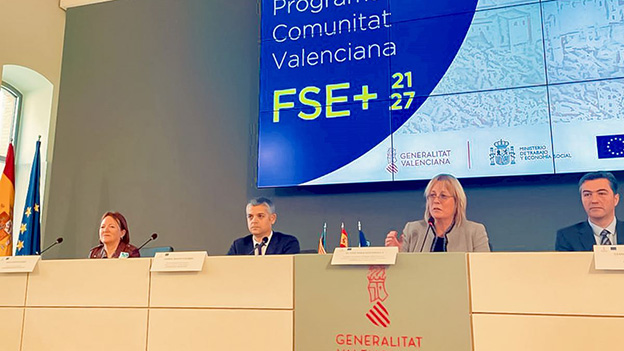
Regional and national authorities in Spain organised launch events across the country to kick-start the implementation of the new 2021-2027 cohesion programmes, including the European Social Fund Plus (ESF+). The ESF+, which is the EU’s main instrument for investing in people, will support women, young people, unemployed and long-term unemployed people to find stable, quality jobs, enhance the social inclusion of vulnerable people and reduce child poverty.
The EU will contribute €11.3 billion to Spain’s €16.3 billion ESF+ budget, which will be implemented through four national thematic programmes: Employment, Training, Education and Social Economy; Social Inclusion; Youth Employment; and Material Deprivation. The ESF+ in Spain will also fund activities through 19 regional programmes – one per autonomous region or city.
Nearly 40% of Spain’s total ESF+ budget will be dedicated to employment and labour-market activation measures, with almost half of this amount improving opportunities for young people. Spain will invest €24 million into mobility measures for disadvantaged young people not in employment, education or training (NEETs), with a particular focus on funding projects at the regional level, implementing the new Aim, Learn, Master, Achieve (ALMA) initiative, which offers short-term work placements abroad.
Focus on social inclusion
Support to vulnerable people is a priority for ESF+ in a post-pandemic context. Spain will therefore invest more than €5 billion to improve social inclusion, with a particular focus on supporting persons with disabilities and minimum-income beneficiaries, women who are victims of violence, ex-offenders, Roma and migrants.
More than 10% of Spain’s ESF+ investments will be used to alleviate child poverty and improve access to basic rights and services for vulnerable children and their families in line with the EU Child Guarantee. Actions of strategic importance will promote family-based care and modernise the child protection system. Other actions will promote the development of free, early childhood education and care. The programme will also propose innovative actions in schools to promote healthy lifestyles.
Nearly €550 million will be used to finance the distribution of food and essential goods to the most deprived, including homeless people, Roma and low-income families with children.
Skills for the future
Skills play an increasingly important role for the Spanish economy. The ESF+ in Spain will allocate over 20% of its budget to improve access to quality education and training. Actions will focus on preventing and reducing early school leaving, including through increased access to quality early childhood education and care and by promoting inclusive education.
The funds will also help modernise and increase the offer of vocational education and lifelong learning systems. The creation of new vocational education and training places, particularly in emerging green and digital sectors, and the transition to a dual VET model will be of strategic importance. The previously funded project, ‘Making Youth Fit for the Digital Age’, illustrates the importance of actions in this sector. The project provided digital transformation courses for 16–30-year-olds, and showed how access to ICT training can help overcome barriers to entering the job market, especially for young people lacking digital skills.



